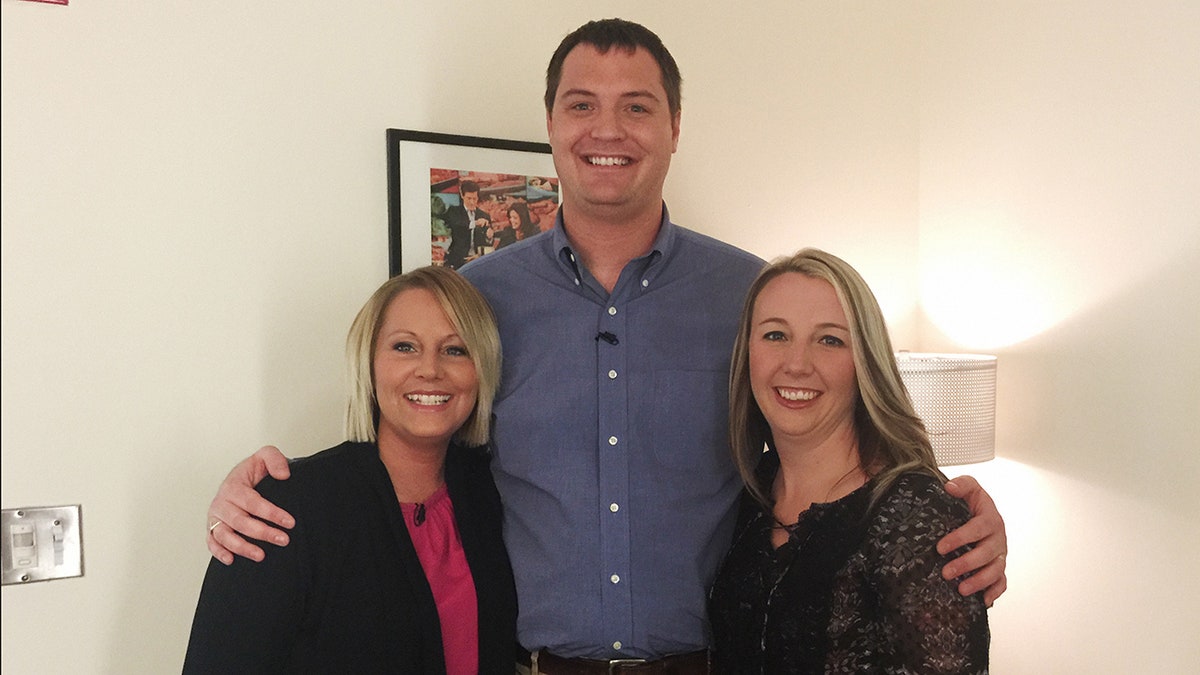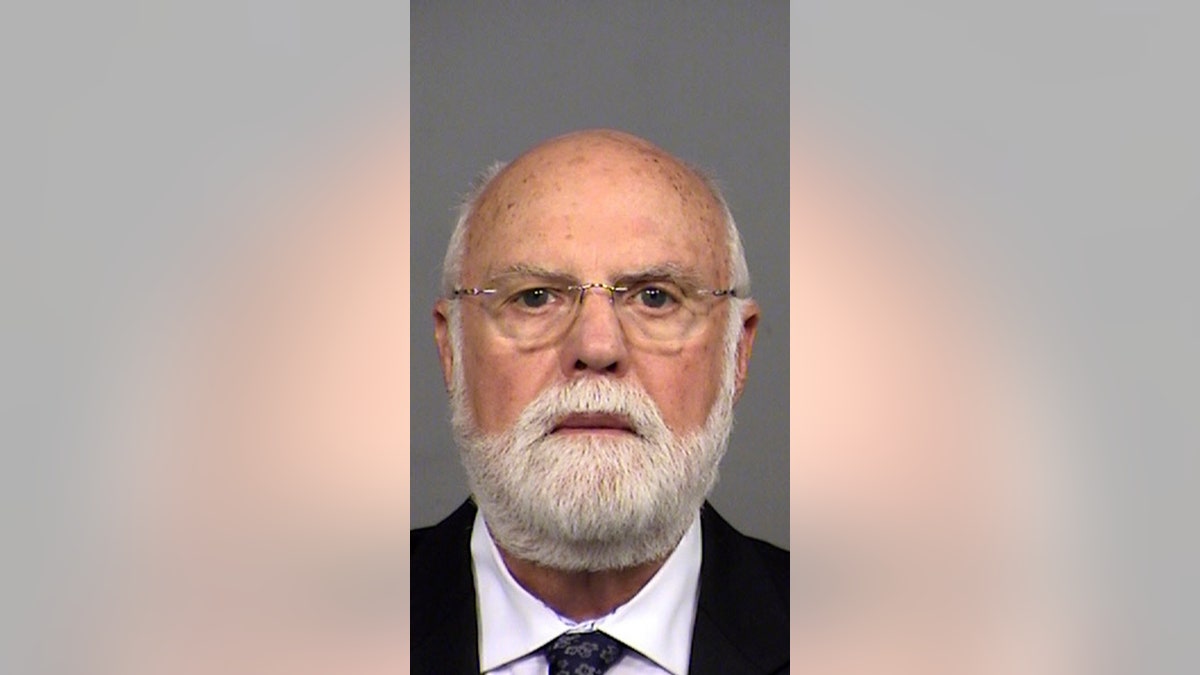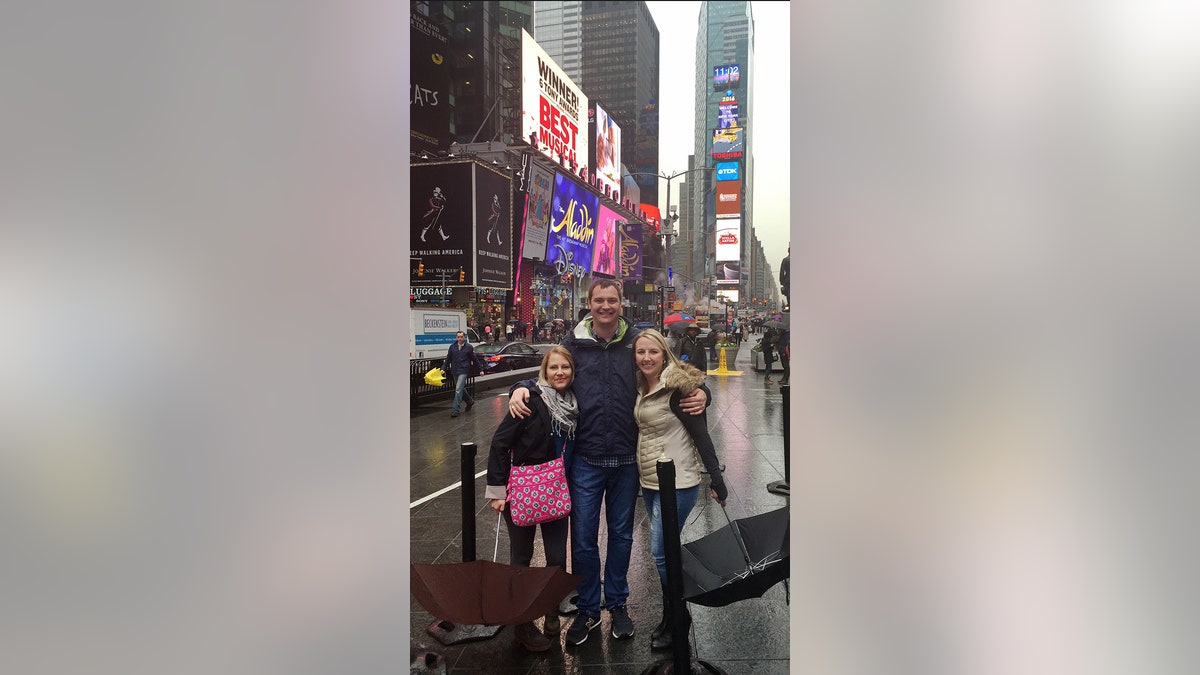
This photo provided by Matt White shows him with Jacoba Ballard, left, and Julie Harmon. The three one-time strangers have reached out to 21 others who've been linked through DNA tests as their half-siblings, which they claim is evidence that Donald Cline is their likely biological father. (AP)
Matt White remembers that day in September 2016 when a mystery began to unravel that would change his life.
It started when White read a news report that Dr. Donald Cline, a retired Indianapolis fertility specialist, faced charges for lying when he denied he'd inseminated unwitting patients with his own sperm decades earlier. He searched out Cline's address online, recognizing it as the location of his mother's former doctor. Then he Googled the doctor's name. When a photo popped up, he was stunned: He looked like Cline.
"It was just too similar to be coincidental," he says. White had long known he was a donor baby, but that day, he had an eerie feeling he was staring at the man who was likely his biological father.

Dr. Donald Cline received a one-year suspended sentence for lying when he'd denied being a sperm donor to unwitting patients. (AP)
Around the same time, Julie Harmon saw a TV news story about Cline. She'd discovered years earlier that her blood type indicated she was not the child of both her parents. She didn't follow up to find out why, but the report about Cline, her mother's fertility doctor, was unnerving.
"In the pit of my stomach," she says, "I knew something was wrong."
FERTILITY DOCTOR ACCUSED OF IMPREGNATING PATIENTS WITH OWN SPERM RECEIVES NO JAIL TIME
The TV story featured Jacoba Ballard, whose mother had also gone to Cline and whose complaint to the state helped launched an investigation. Harmon contacted Ballard through Facebook, and they traded photos. There were striking similarities.
"I looked at pictures of her, and I knew," Harmon says. "We even part our hair the same."
These two women and White recently crowded into an Indianapolis courtroom to hear Cline receive a one-year suspended sentence for lying to investigators when he denied wrongdoing; DNA tests determined he is the biological father of Ballard and another woman whose mother was his patient. Cline apologized "for the pain my actions have caused" but didn't specify how often he used his own sperm in procedures — court documents say he told Ballard about 50 times.

Jacoba Ballard, Matt White, and Julie Harmon, have forged a kinship as brother and sisters. (Matt White)
Cline's sentencing, though, was not the end of this story. Instead, in an extraordinary epilogue, three one-time strangers — White, Harmon and Ballard — have forged a kinship as brother and sisters, even as they wrestle with the revelation about their identities. They've also reached out to 21 other men and women, all in their 30s, who've been identified through DNA tests as half-siblings — evidence, they say, that Cline is likely their father, as well. About a half-dozen of them live in central Indiana.
Many stay in touch through a private Facebook page, and several gathered last fall for a cookout with their spouses, children and three mothers who'd been Cline patients. Others have gone on social outings, shared childhood photos, taken note of similarities (most of the men are over 6 feet tall) and, at times, confided in one another private details of their lives.
"It's a very surreal experience," White says. "I've shared personal stories that I haven't shared with anyone but my wife. You have almost this instant bond with people who are not only part of this horrible situation, but you can relate to them on an intimate level in a way you can't with anyone else."
FERTILITY DOCTOR ACCUSED OF SWAPPING DONOR SPERM WITH HIS OWN
White says they've joked about having a ready pool of possible bone marrow and transplant donors. But this DNA discovery has left emotional scars, too. For the three public faces of this unique club, it has been a wrenching experience.
Jacoba Ballard was angry when she sat in court in December, describing a three-year ordeal that determined Cline is her biological father.
"There has not been one part of my life that has not suffered," she told the judge. "I find myself mentally drained by thinking of this constantly. I now have anxiety, panic attacks. ... I isolate myself from family and friends."
Ballard, 37, says Cline told her mother he used donor sperm from medical residents. She'd known since she was 10 that she was a donor child, but in 2014, Ballard grew curious about her family history and thought she might be able to track down some brothers and sisters. She took a DNA test from 23andMe.com, a biotech company that uses saliva samples to determine ancestry and identify distant and close relatives, health risks and physical traits.
Clients can choose whether to be identified in a "DNA relatives tool" that connects them to others. When Ballard's results came back, they listed seven half-siblings, all but one identified by name. Ballard and two others got together, assembled a family tree and realized one common thread: Their mothers had gone to Cline for fertility treatments.
Ballard and a half-sister arranged to meet with two of Cline's adult children. At first, she says, they denied their father had been a donor, then said he'd done so in a small number of cases. About a month later, Ballard and a group of the half-siblings met with Cline himself, and she says he told conflicting stories, finally saying he'd donated sperm about 50 times to help unknowing patients who desperately wanted children.
When Ballard filed a complaint with the Indiana attorney general's office, Cline responded in a letter that anyone accusing him of being a donor "was guilty of slander and/or libel." At his sentencing, he acknowledged using his sperm. "I was foolish in my actions, and I should not have lied," he said.
Ballard's DNA match to Cline was 99.9997, court records show.
The case wasn't the first of its kind. In Virginia, Dr. Cecil Jacobson was convicted in 1992 of fraud and perjury for using his sperm to impregnate patients without telling them. Cline was convicted of obstruction of justice for lying to investigators, but a measure pushed by Ballard and others was introduced in the Indiana Senate this year to make it a crime for doctors to treat patients for infertility by using their own sperm or egg without consent. The measure didn't receive a hearing, so it's dead for this session; its sponsor has not yet decided if he'll reintroduce it.
"I feel like our mothers were violated," Ballard says. "He has torn all of our lives apart."
If there is any comfort, she says, it's in the camaraderie that's developed among several half-siblings. They've gotten together for concerts, an occasional softball game for one of their kids and a few Christmas celebrations. White and Harmon attended the high school graduation ceremonies of Ballard's two children, and the two women speak every day. They laugh about their similar tastes; they even prefer the same order at McDonald's — no onions.
But Ballard has regrets, too. "He cheated himself out of knowing his children. That's what we are."
As for her half-siblings: "We also feel cheated that we didn't get to know each other growing up."
Julie Harmon always believed she had a biological bond with her father.
"I grew up thinking I had these characteristics of my father — his eyes, his skin tone. I'm flat-footed; my dad was, too. But then, 35 years later, for that to be ripped away from you — it's really hard. I see a counselor to help with it, but I still cry about it every day."
Harmon's mother, Dianna Kiesler, says that based on discussions with Cline, she thought her husband was her donor, and after many years of trying, she was able to conceive with the help of drugs Cline prescribed. After Julie's birth, her mother was so thrilled she visited the doctor to show her off.
Then decades later, Harmon took a 23andMe test at Ballard's urging. The results that identified her as a half-sibling were devastating.
"I've lost my entire identity," says the 36-year-old nurse. "Everything that I've known up until this point is not there."
Barry Starr, a Stanford University geneticist, says if two people are identified as half-siblings from a DNA test and they don't have the same mother, they will share the same father, assuming they aren't grandparent and grandchild, uncle and niece or, in rare cases, first cousins.
Harmon says her father was crushed by the news. "He doesn't talk about it to me," she says. "He was very worried my kids would think he wasn't their grandpa anymore. He's very angry."
Her mother, though, says: "No matter what happened, our daughter is our daughter. I carried her for nine months. He has helped her for 36 years. ... She knows who her real parents are."
Harmon says whenever she receives an online notification that a DNA test has identified another half-sibling, either she, Ballard or White will check Facebook to see if they have mutual friends who can explain the situation. If not, one of the three will try.
"Most of these people who are taking these tests have no idea that they have just opened up Pandora's box," she says. "They have no idea how their lives have changed.'"
Some prefer no further contact, but Harmon has formed deep friendships with others.
"I consider all of them my brothers and sisters," she says. "I have all these siblings that I can talk to and spend time with and rely on. I couldn't imagine going through this on my own. At least we all have each other, because no one truly understands this unless you've been through it. ... We're all in this together."
The day after Matt White first saw a photo of Cline, he embarked on his own search for answers.
He contacted Ballard and took a 23andMe test, constantly checking for results. He'd known since he was a teen that he was conceived through a donor and had no interest in finding his biological father. Cline, he says, had told his mother her donor was a medical student — the same explanation he'd offered to many fertility patients.
"I went from not having a care to wanting to know everything," says the 34-year-old White. He tracked down a medical school graduation photo of Cline and studied photos of Cline's son online, noticing similar facial traits — a round face and high forehead.
He's also detected a strong resemblance to Ballard.
"When I first met Jacoba, even to this day, I have a hard time not staring at her," he says. "I see so much of my face in her."
The connection, though, goes beyond appearances. White says he clicked instantly with another half-sister who was a 99.998 DNA match to Cline. At their first meeting, White says, they talked for five hours, developing an instant rapport.
White, a biologist, says he's been able to open up with his new half-siblings, even discussing his own infertility problems, something he's spoken about with very few people. White and his wife have two children conceived through in vitro fertilization.
"I've pretty much given up all my life's secrets," he says.
For a time, White says everywhere he'd go in the Indianapolis area, he'd be searching for anyone who resembled him, wondering: "Are they my brother? Are they my sister?"
With DNA tests becoming more popular, White believes their group will grow. As recently as a few weeks ago, he learned of another half-sibling. All were born between 1979 and 1987, and considering that's a long span, he says:
"To think we've found all of us in a two-year period? That's not likely. There's got to be many more children out there."








































